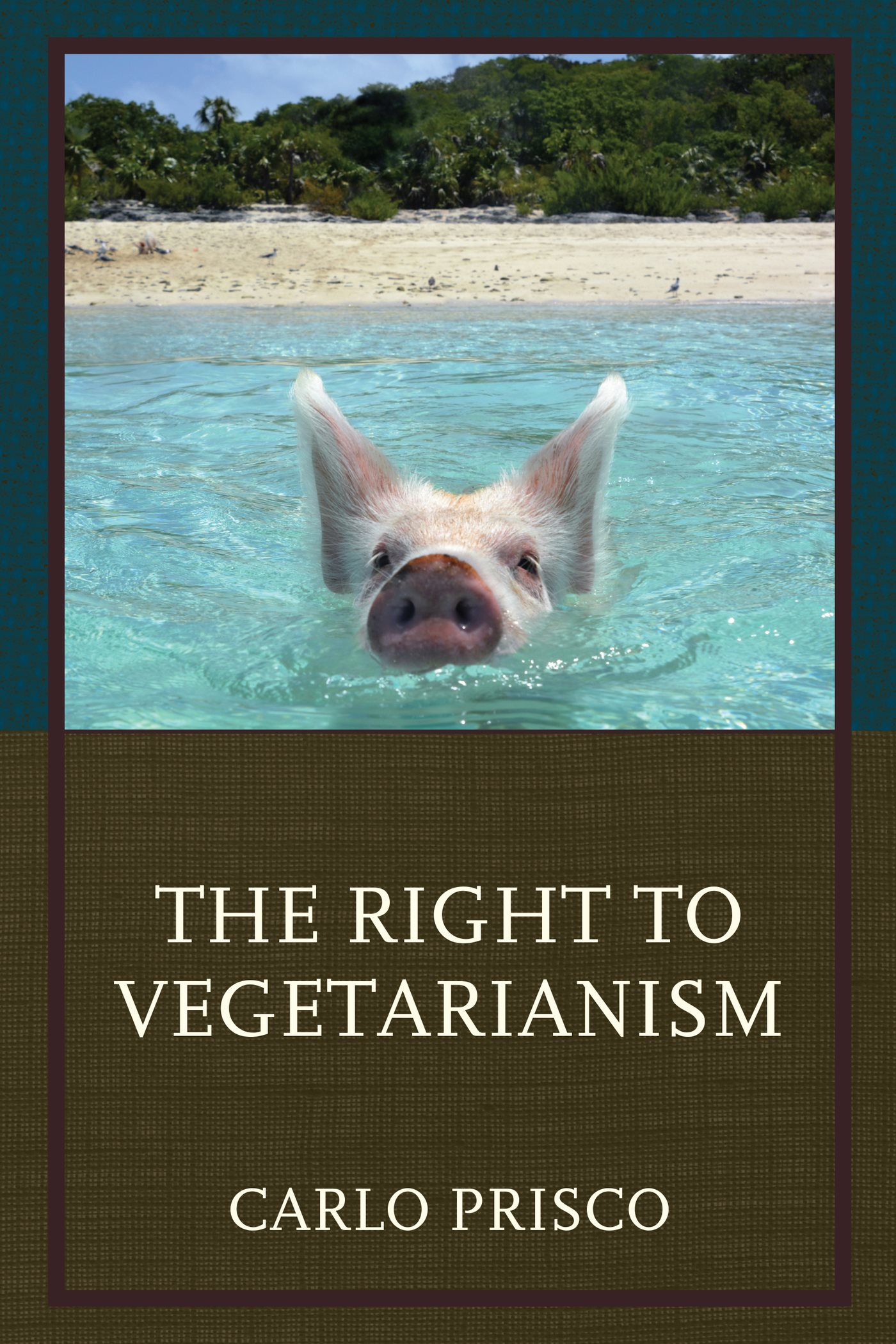The Right to Vegetarianism
Carlo Prisco
Hamilton Books
An Imprint of
Rowman & Littlefield
Lanham Boulder New York Toronto Plymouth, UK
Copyright 2017 by Hamilton Books
4501 Forbes Boulevard, Suite 200, Lanham, Maryland 20706
Hamilton Books Acquisitions Department (301) 459-3366
Unit A, Whitacre Mews, 26-34 Stannary Street,
London SE11 4AB, United Kingdom
All rights reserved
Printed in the United States of America
British Library Cataloguing in Publication Information Available
Library of Congress Control Number: 2016953903
ISBN: 978-0-7618-6866-8 (pbk : alk. paper)ISBN: 978-0-7618-6867-5 (electronic)
 TM The paper used in this publication meets the minimum requirements of American National Standard for Information Sciences Permanence of Paper for Printed Library Materials, ANSI/NISO Z39.48-1992.
TM The paper used in this publication meets the minimum requirements of American National Standard for Information Sciences Permanence of Paper for Printed Library Materials, ANSI/NISO Z39.48-1992.
Dedicated to all those who seek to defend their right
to live with respect for others... of any kind
Foreword
In the 1990s, Anna Charlton and I had a legal clinic at Rutgers University School of Law that involved cases that concerned animal issues. Although we called our enterprise the Rutgers Animal Rights Law Center, the reality is that animal did not then and do not know have any rights that are recognized by law. We represented humans who had legal rights and we argued that those rights required that the law respect our clients views about animals.
For example, we represented students who did not want to use nonhuman animals as part of their coursework. We represented prisoners who wanted vegan food. In both cases, we argued that our human clients had constitutional rights to freedom of conscience that required schools and prisons to respect their choices. We called ourselves animal rights lawyers, but we were really human rights lawyers who focused on situations where the exercise of those human rights involved nonhuman animals.
In this book, Carlo Prisco, the leading lawyer concerned with animal issues in Italy, comes to the conclusion that a right to vegetarian food (understood as food that contains no animal products) is one that cannot be grounded in animal rights because animals are property. They have no rights. Humans have rights, including the right to exploit their animal property. He argues that we must focus on human rights, including both constitutional and statutory rights, as a basis for a right to vegetarian food and he explores all the aspects and implications of such a right.
He also discusses the emergence of animal rights as a philosophical matter and he considers the status of animals within the law.
Priscos writing is not based just on theory. In addition to being an academic who specializes in legal philosophy, he is a practicing lawyer who has had extensive experience dealing with these issues in real contexts. For example, in 2015, Prisco prevailed in an important case in which he successfully challenged a school districts requirement that a parental request for vegan food for a child had to be supported by certain health-related requirements that were not imposed on other children.
This book involves a fascinating mixture of theory and practice, and of philosophy and law. I look forward to Priscos work as I am confident that he will emerge as a leading international figure in animal ethics and law. Hes well on his way.
Gary L. Francione
Rutgers University School of Law
May 30, 2016
Introduction
First of all, a terminological clarification is needed: the term vegetarianism is not used here to distinguish what we usually call vegetarianism from veganism, but in its original meaning, that is not (obviously!) lacto-ovo vegetarianism, but, actually, any plant-based food, excluding all animal products.
The purpose of this work is to demonstrate the existence of the right of people to eat according to their ethical orientation. This orientation may lead them to eat lacto-ovo vegetarian, or vegan, or even fruitarian. The foundation of the protection is the same, and the underlying ethics refers to the respect toward nonhuman animals.
The concept of Animal rights is a modern one, born in what Norberto Bobbio called the age of the rights, which was raised in the West in the twentieth century.
The animals referred to are, of course, nonhumans; international movements asked that we recognize the ownership of legal positions worthy of protection by the law for them.
The beginnings of the modern animal rights idea can be found everywhere in Western history, especially in ancient philosophy that, since the Orphic cults, attributed value to all beings, human or not, and sometimes even inanimate objects.
While it is impossible to speak about animal rights in ancient philosophy, what stands out is undoubtedly the principle of respect, that is a duty to refrain from harming humans and nonhumans.
Contemporary philosophy has taken up and developed some of the themes of the ancient philosophy, while some new were introduced, finally founding a philosophical and moral system that recognizes animal rights.
While, for the philosopher, it is easy to relate to the category of rights, extending it to nonhumans, the lawyers way is likely to be more complex and difficult, as it will have to take into consideration the positive law.
The aim of this work is to analyze the most controversial aspects of the latest legal and philosophical currents on the subject, trying to approach them with a critical scrutiny to determine what is, or what could be, the state of the art.
Assuming that there is no legal system that includes animal rights, it is still possible to see an evolution of the Western laws from the initial consideration of nonhumans as mere property, to affirm certain obligations and restrictions regarding practices that involve animals.
The difficulties encountered by the law with nonhuman subjects lead, according to the animal rights philosophers, to a discrepancy or schizophrenia: the ratio legis seems to manifest considerations that are not reflected in a concrete way, or are contradicted by other laws, or limited in various ways.
While it could seem improbable, the rules relating to animals among Western countries are surprisingly similar, as similar as the ideological approaches.
The scope of this work will go beyond the limits and specificities of animal issues addressed in philosophy and those taken into account in the law, rather trying to combine the two disciplines in search of the lowest common denominator.
The main animal rights contemporary thinkers, despite the profound differences that separate them, believe that there cannot be any recognition of animal rights while they are used for food, and all of them agree that vegetarianism/veganism represents a moral imperative.
When philosophy comes to the food issue, it encounters (or clashes with) the most varied ideas, disciplines, circumstances, habits, and spiritual and religious beliefs. Without connecting all these elements together, it is impossible to make the philosophical precepts actual laws.
The food issue will be examined, beginning from the philosophical point of view, to legal questions, to help us understand how the contemporary law deals with it.
Arguing about the new challenges of the matter implies a step back to the origins. Where is it rooted? The questionas we knowis ancient and controversial, and it would be impossible to fully explore it in this work, but whoever is going to approach the issue will have to relate, at least in broad terms, with the main currents of thought about the foundation of rights.

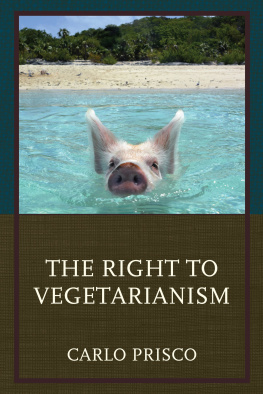



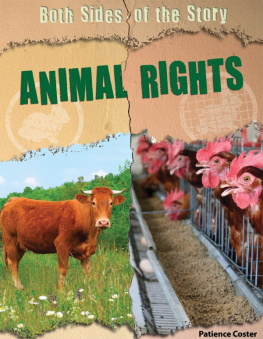
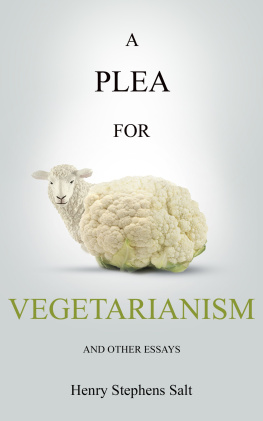
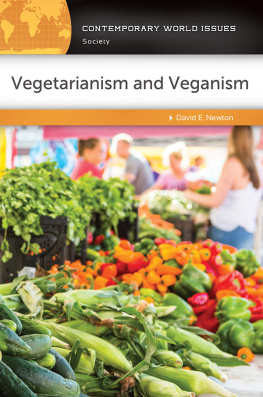

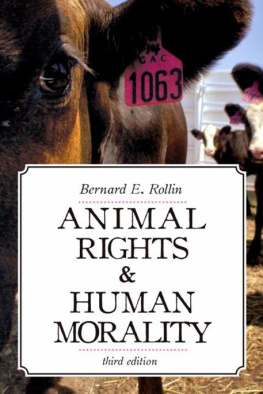
 TM The paper used in this publication meets the minimum requirements of American National Standard for Information Sciences Permanence of Paper for Printed Library Materials, ANSI/NISO Z39.48-1992.
TM The paper used in this publication meets the minimum requirements of American National Standard for Information Sciences Permanence of Paper for Printed Library Materials, ANSI/NISO Z39.48-1992.